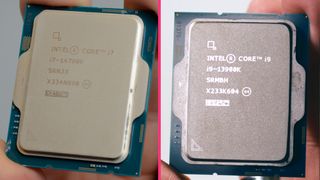Intel’s much-awaited microcode replace designed to mend instability problems with its Thirteenth- and 14th-gen CPUs – or a minimum of act as a preventative measure – is at the cusp of arriving, and Workforce Blue has confident us that it doesn’t include any nasty side-effects at the efficiency entrance.
Certainly, the patch is now in beta BIOS variations, significantly from Asus, which as Phoronix.com reviews has deployed those beta releases for a raft of its motherboards, and the tech website online has performed some efficiency checking out (below Linux). So, how does that fit up with Intel’s personal benchmarking? Let’s dive in and in finding out…
TechSpot spotted Intel’s newest commentary at the instability gremlins, with Workforce Blue’s personal checking out performed throughout a variety of apps and video games to exhibit there was once no efficiency hit from the patch.
Intel’s benchmarks display that whilst the usage of ‘Intel Default Settings’ (which means inventory settings, and indubitably no overclocking) any efficiency distinction was once “inside of run-to-run variation,” which means there was once no significant have an effect on (or any distinction was once inside of anticipated error margins).
This was once throughout assessments together with 3DMark TimeSpy, Cinebench R24 and Blender 4.2.0. The notable caveat was once that “a couple of sub-tests [showed] average affects” and that incorporated the PugetBench GPU Results Ranking.
It was once a an identical tale for gaming assessments being inside of anticipated run-to-run diversifications, and this incorporated Cyberpunk 2077, Shadow of the Tomb Raider, and Overall Struggle: Warhammer III – Mirrors of Insanity. Then again, there was once one exception – Hitman 3: Dartmoor – the place the sport skilled “reasonably extra have an effect on.”
So, what did Phoronix.com uncover in its checking out of the beta microcode patch with an Intel Core i9-14900K processor in an Asus Top Z790-P Wi-Fi motherboard?
The excellent news is the website online’s effects extensively echoed Intel’s findings, for the reason that general, there was once hardly ever any noticeable distinction – however there have been occasional larger drops in efficiency in positive assessments.
The ones drops to the song of 6% to ten% came about within the likes of Python scripting and WireGuard (networking pressure check), Phoronix.com observes.

Research: no efficiency worries – and a phrase on long term CPUs, too
Briefly, the chance of the typical consumer seeing any impact is slender, but it surely’s nonetheless conceivable that the strange software, or recreation, would possibly witness a little bit of an additional efficiency headwind from the patch. If so, although, the adaptation won’t also be noticeable, realistically.
Take into account that it is a restricted set of assessments – a batch run via Intel itself, and a batch on Linux – however nonetheless, it offers us a gorgeous just right thought of what we’re in for, and it kind of feels as though any fears of a efficiency hit are unfounded. That is, after all, nonetheless a beta unencumber of the microcode replace too, so one of the crucial wrinkles in proof with those check runs may just also be ironed out relating to unencumber.
The completed BIOS variations with the microcode patch implemented must be out quickly, as Intel promised they’d arrive in mid-August. Thoughts you, with the beta handiest simply having emerged, it kind of feels most likely the overall deployment of the patch will occur later in August – although it must be this month, needless to say. In spite of everything, Intel can’t truly hang out, as people are rather apprehensive in regards to the well being in their CPUs at this time.
Any other attention-grabbing nugget in Intel’s newest commentary runs as follows: “Intel may be confirming, according to intensive validation, all long term merchandise might not be suffering from this [instability] factor.”
Which we presume method long term Thirteenth- and 14th-gen processors, in addition to next-gen CPU levels from Intel. This means that the microcode replace will likely be baked in for Raptor Lake and Raptor Lake Refresh CPUs going ahead, reasonably than the rest having modified at the manufacturing aspect for the ones present chips (although it doesn’t rule out the latter risk, thoughts).
As you’re most likely mindful for those who’ve been following this saga, Intel is constant to analyze those instability woes and eventualities the place they’re prompted, and likewise advises within the commentary that it’s going to supply an additional replace on any conceivable different mitigations via the tip of August. That suggests there might be able to be an additional microcode replace within the pipeline, too.

Allow 48h for review and removal.